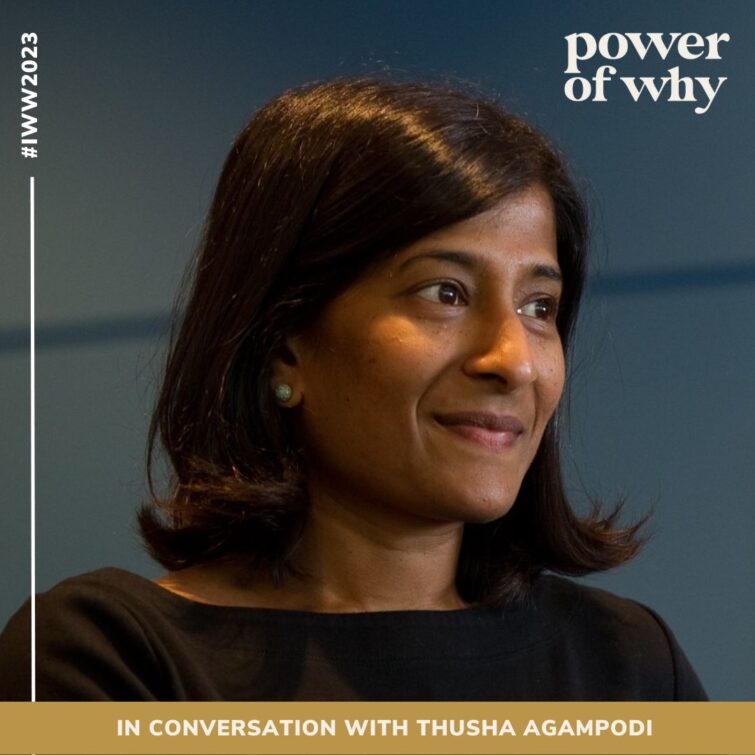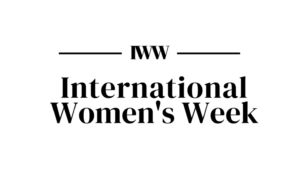Home » Thusha Agampodi Is Building a Legacy Her Children Can Be Proud Of
Thusha Agampodi Is Building a Legacy Her Children Can Be Proud Of

Mar 14, 2023
 This featured story is brought to you by the Power of Why Podcast in collaboration with Invest Ottawa, with critical support from BDC Capital’s Thrive Venture Fund and Title Sponsor of International Women’s Week. We teamed up to produce this special series to celebrate women leading in Ottawa for International Women’s Week (IWW 2023) and shine the spotlight on our IWW 2023 featured leaders to unpack their passion and purpose.
This featured story is brought to you by the Power of Why Podcast in collaboration with Invest Ottawa, with critical support from BDC Capital’s Thrive Venture Fund and Title Sponsor of International Women’s Week. We teamed up to produce this special series to celebrate women leading in Ottawa for International Women’s Week (IWW 2023) and shine the spotlight on our IWW 2023 featured leaders to unpack their passion and purpose.
Each year, five inspirational leaders are selected to represent International Women’s Week. They are role models achieving a significant impact on our economy, community and society, and embody the spirit, goals and values of IWW.
How will you be remembered?
When her parents suddenly passed away, 11-year-old Thusha saw how their devotion to others kept them alive — an unquenchable force, multiplied in the hearts they touched.
Today she carries their torch, seeking spaces where her impact can grow.
Building engineering teams at BlackBerry and Magnet Forensics. Advocating for diverse representation in tech. Mentoring the next generation of women in STEM. Accelerating the adoption of sustainable energy as Aurora Solar’s Director of Engineering.
Here’s how she keeps her eye on the horizon.
Listen to the episode on Spotify / Apple Podcasts / Google Podcasts
This episode is for you if:
- You’re passionate about social impact and tech
- You’re considering a career change, but worry it’s too late
- You struggle to negotiate at work
- You’re a manager who wants to create stronger, more collaborative teams
Looking for a specific gem?
[2:39] What it’s like to grow up in Sri Lanka
[3:15] Book fairs = Thusha’s happy place
[4:42] When work is an extension of your childhood self
[8:50] Giving kids space to grow, experiment and explore
[11:42] The irresistible world of climate and solar tech
[12:27] To generate good ideas, normalise sharing bad ones
[14:54] Is self-doubt stopping you, too?
[15:40] Thusha’s work is about making (and growing) her impact
[17:00] You have to ask for the things that you want
[21:00] The electrifying power of women on stage
[24:52] Who aren’t you hearing from?
[27:19] When someone makes a mistake, how do you respond?
[36:17] You have more transferable skills for tech than you think
[38:00] The courage to change careers makes some of Thusha’s best hires
Listen to the episode on Spotify / Apple Podcasts / Google Podcasts
Tune in to the podcast or take the time to digest each article found below. Regardless of the format, there’s great content in store for you!
Naomi Haile: How would you describe your childhood?
Thusha Agampodi: I grew up in Sri Lanka, where I spent about 14 years of my life. Growing up in a Buddhist household, my parents were heavily involved in our community. As kids, I’d complain, but they’d drag us to all their events, to volunteer. They were demonstrating by example how much they gave back to the community.
I can see all the compassion and kindness that was around me. I’m so grateful to my parents for sharing those values with me. As a kid, I climbed trees, played a lot of cricket, and read an incredible amount. My dad used to take me to book fairs. Just the smell and looking at bookcases full of new books was where I found the most joy.
When I was around 11 my parents passed away. The grief came much later in my life. You look back and see all the events that your parents were not there for. I learned a lot going to their funeral and seeing the community they supported celebrate their life. That’s how I would like to live my life. The biggest lesson is knowing how short life is.
How I was as a kid is reflected in the work I do now. I was always the one with ideas and I got the kids in the neighbourhood to help me execute them. We created a library every Saturday. We set up a big campsite and all the kids came together with the material we needed. We put the Olympics together. Looking back it’s less of a surprise that I’m where I am now.
Naomi: You wrote about the funeral and how everyone came to celebrate your parents. I don’t think this tradition is practised in many cultures. Did you find that it helped the grieving process?
Thusha: Having all of those people talk to me about the difference my parents made in their lives— and they still do, when I go and visit and they learn whose daughter I am — makes my parents live on for so much longer than they were here for.
Now that I’m a parent I’m thinking of how I can leave this for my children, so that someone will tell them that I made a difference.
It’s a gift to leave behind a good memory. I’m grateful my parents did that for me.
Naomi: That’s legacy, this idea of what you leave behind. What nurtured your boldness?
Thusha: In Sri Lanka there’s an expectation, especially for girls, to follow a certain path. And I wasn’t. I give credit to my parents for creating that space. I don’t remember them trying to hold me back. Even a small thing like playing cricket — not many girls did that.
I was a bit of a tomboy. My dad worked at a university that had a good engineering program and he’d bring me with him. In hindsight I wonder if this was on purpose, because sometimes on the weekend he’d say “oh, I need to go into the lab to grab something.” I was fascinated by the lab equipment, the books, and seeing students walking around.
They gave me a lot of space and opportunity to explore my interests. We didn’t have the internet or TV for most of my childhood, so I didn’t have much else to do with time. That helped my imagination.
Naomi: Your work today really leans into that curiosity and experimentation. What does your day-to-day look like now?
Thusha: I’m coming up on a year and a half at Aurora Solar and it’s been a dream role. Going into software, you don’t always think of the impact you can make, especially early on. But it’s everywhere now. Sustainability and solar energy are aligned with my values.
As Director of Engineering, I get to support multiple teams of engineers who are talented, passionate and kind. I get to help them build good relationships with each other and foster an environment where they can share good ideas, and bad ones too. That’s easy to say, but it’s hard to do. I love it.
Naomi: How did you know this industry was right for you?
Thusha: I didn’t think much about the path I wanted to take.
There’s some people who come out of university knowing where they want to go with their career. I wasn’t one of them.
Naomi: Out of all the episodes I’ve ever recorded, no one has ever told me that.
Thusha: Everyone looks like they have it figured out. I only knew I wanted to be in software. I love the field, how quickly you can make a change with a few lines of code. I didn’t plan on going into leadership. I enjoyed working at small startups and Blackberry, where I was for 12 years. I had a great manager who recognized my leadership abilities and recommended me for a promotion.
In hindsight, I wish I had been the one to ask, but at that point in my career I didn’t have much confidence. I was the only woman on the team. There was a lot of imposter syndrome. After that I didn’t look back.
Titles didn’t really matter, and they still don’t. What’s important is that I get to work somewhere where I can grow my positive impact.
If I leave somewhere it’s because that’s missing, or I’ve hit a cap where I’m not feeling heard or there is no more room for me to grow. At Aurora Solar I feel like I’m doing some of my best work.
Naomi: You said you wished you raised your hand for that promotion yourself. Why?
Thusha: I get asked this question a lot. I’m mentoring young women who are moving into leadership positions, and I want them to recognize their capabilities, to speak and ask for what they want. I didn’t, and I wish I thought about what I wanted. Asking for a promotion or a raise, it’s been difficult for me. I’ve read the data about it being harder for women.
We can’t be guaranteed a leader who will advocate for us, so recognize where you want to go and how you can ask for it.
I just wish I had my own examples to share so I’m not a hypocrite.
Naomi: You’re speaking to self-awareness, and being able to identify where you’re strong, where you want to grow, and where you need to improve. Underpinning all of that is what you enjoy, what are you naturally good at? How can people take that and be more vocal, more intentional in their career?
Thusha: I’ve always wanted to encourage more women in tech, more diversity in tech. I wanted for a very long time until I felt like I had something valuable to share. I kept telling myself, “I’m not ready yet, but one day I will do this.” Then I went to an event that had a panel of women leaders and it occurred to me that just their presence on that stage was enough. It was so rare.
At that point I was already in engineering leadership. I had to go out there and talk about my experiences to encourage or inspire others.
Hearing other women who are ahead of me in their career talk about unconscious bias or micro-aggressions was incredibly validating.
I want to do the same for others. If nothing else, maybe it can give you some courage to share your opinion, give your input, and continue.
Naomi: When did you realise that being a change agent was your calling?
Thusha: I’ve lived it. I knew what it felt like to be underrepresented on a team and how hard that made it to get your opinion out. I approach everything with a DEI lens. If we don’t have inclusion, you’re not hearing from everyone you’ve hired and you’re wasting your money. It’s in the data. Studies show that your profits are affected by the diversity of your team.
The best idea, the best product, innovation — it doesn’t happen when a group of people share the same idea and agree with each other. It requires debate, disagreement, and doing it in a healthy way.
That’s hard. It takes work. When I’m in a meeting, I’ll look to see who we’re hearing from. Who’s underrepresented? How do I get their opinion?
Naomi: In Jim Collins’ book “Good to Great: Why Some Companies Make the Leap… and Others Don’t”, he talks about “getting the right people on the bus” and building a team that’s in line with your mission, and how important that is to organisational goals and a team’s effectiveness. What can you share about building a successful team?
Thusha: Great book. I’ve read data Google put out, a while ago, on what marks a great team. They found that psychological safety is necessary for people to share ideas. We can have a great idea but not be 100% sure of it, or have a good idea and need to validate it with our team.
I train my team on how to respond to each other when we make mistakes. It has to be okay. What’s not okay is if we don’t learn from them. We want to set the right monitoring in place, so we’re not releasing large mistakes to the customer and the product.
With the right processes in place, we have the safety to take risks, try new ideas, experiment and learn from our mistakes.
At Aurora Solar we have onboarding sessions where we talk to software engineers about code reviews. How do you approach that with empathy? It’s something we do many times a day, every day. You’re putting it up not for people to say “this is great,” but for people to find your blind spots. By design, you’re getting perspectives that are different from yours.
How do you write code so someone else can debug it? So much of what we do is teamwork and making sure we like and respect each other. Having fun together is important to me. Building relationships and caring about each other, even outside of work, makes it so much easier when you have to have those hard conversations. I invest a lot in making relationships, so if they have to bring up something that’s not working, they have the courage to do it.
Naomi: These are some very tangible tips. It speaks to the longevity of your work. The trust, care, empathy, process. I’d love to switch gears a bit and talk about the value of mentoring.
Thusha: I love that I got to sponsor a scholarship at my high school. When I moved to Canada at 14, I went to that school and took English as a second language (ESL). I got so much out of that school, so I wanted to give back. I know how hard it is when you’re new to a country, to the language.
Finding a sense of belonging takes time. So much of yourself doesn’t get seen when there’s that language barrier.
In my first years in Canada, I met great friends who were going through ESL too, and there were great teachers. When I graduated, I was the editor of our high school newspaper, which I’m so proud of because I was in ESL just a few years before. The award I sponsor is for the graduating student with the highest academic standing from the ESL classes.
I visit once a year, though we haven’t done it in the pandemic, to talk to ESL students about my journey because I know how hard it is. They always ask how long it took me to learn English. Do I have tips so they can do it faster? It’s one of the biggest barriers.
With Carleton University I’ve gone to high schools to talk about engineering and why everyone should consider it. Young girls self-select out. I talk about my experiences because seeing real-life examples can change minds.
Naomi: For my audience, career-switching is also a thing. What would you say to them about the opportunities in your space?
Thusha: Engineering is a very male-dominated industry. Data suggests that women prefer to pick fields where they can see the societal impact they can make with their careers. I’ve been talking to universities in Ottawa about marketing engineering differently, whether that’s in mechanical or software or marketing, to highlight the impact you can make in society.
In software, there’s so much you can do, whether it’s in climate tech, or at Magnet Forensics it was digital forensics software which was used by investigators to uncover evidence for domestic violence or child abuse cases. That’s meaningful work, and they’re just some examples from my own career. I encourage everyone to research the impact you can make in engineering.
Career switching is definitely an option. In software, there are so many boot camps, and courses you can take. Even if you’re not looking to write code, there are so many roles in the industry, and skills that are transferable.
Naomi: Tim Ferris came up with this concept called fear setting, where you write out the worst thing that could happen if you go after your dreams and come up with a plan to tackle it. When you lay things out, you realise that the worst thing that could happen isn’t that bad, but what you could lose from not trying is greater. How have you applied this to get out of your comfort zone?
Thusha: I have a great example, but before I share it, I want to add something.
Some of the best people I’ve hired were ones who had made a career change. It requires courage to go after something you’re curious and interested about.
I find they’re more invested and engaged.
Naomi: That’s really interesting.
Thusha: Early on in my life I had this fear of failure. I didn’t take risks. But I really wanted to do a TEDx. I had set a five-year goal to do one. Two years in I got selected to audition, which in itself is pretty exciting. I wasn’t ready.
It was too soon, but it was something I really wanted. I did it, and it was terrible. In the audition, I was super nervous. Public speaking isn’t really my thing. When I got the email saying that I didn’t make it it was devastating.
It took me weeks to tell my closest friends and family the news because I had to process it before I could say it out loud. But in that year, I accomplished more than I had ever before, in terms of the community and hosting events.
I failed, but life goes on. Realising that helped me take other risks that I otherwise wouldn’t have.
Naomi: As we wrap up the episode, what are you excited about in your industry?
Thusha: For solar, in particular, I’m excited about storage. I want solar on my house, but to be off-grid you need storage. With great advancements you can have whole cities off-grid. I’ve been watching zombie shows, thinking about what happens when there’s no electricity but the sun is still around.
I’m also monitoring everything around AI right now. Everyone’s talking about the battle between Microsoft and Google with ChatGPT. As someone in the industry it’s interesting to watch, but there’s some nervousness about the biases that exist in AI.
People and Resources Mentioned in This Episode
Connect with Thusha
LinkedIn – Thusha Agampodi
Thusha’s Medium Blog
About the Power of Why Host, Naomi Haile

An intrapreneur, consultant, and interviewer.
Naomi Haile is curious about people, their paths and what drives them. In 2017, she launched the Power of Why Podcast. Her guests have taken the non-linear path in business, venture capital and other creative professions to share their story. Each episode explores people’s philosophy on life and work.
As we all navigate our lives and careers, Naomi hopes that everyone she connects with – guests and listeners – can shape products, companies, and communities of impact.
Naomi is a consultant at QuakeLab. She recently graduated from Columbia University, studying Human Capital Management.
Connect with Naomi
In support of its Women Founders and Owners strategy, Invest Ottawa offers programs and services that enable and accelerate the growth and success of women entrepreneurs from every walk of life. Visit www.investottawa.ca/women to learn more!
Invest Ottawa
https://investottawa.ca
Invest Ottawa, is Ottawa’s leading economic development agency for fostering the advancement of the region's globally competitive knowledge-based institutions and industries. Invest Ottawa delivers its economic development services through a unique partnership with the City of Ottawa, where the City and Invest Ottawa, through its members set the strategy and manage the programs that move Ottawa’s economy forward. Invest Ottawa is a non-profit, partnership organization that operates on an annual budget that comes from a variety of sources including: municipal, federal and provincial government; membership fees; professional development programs; and private sector contributions.


